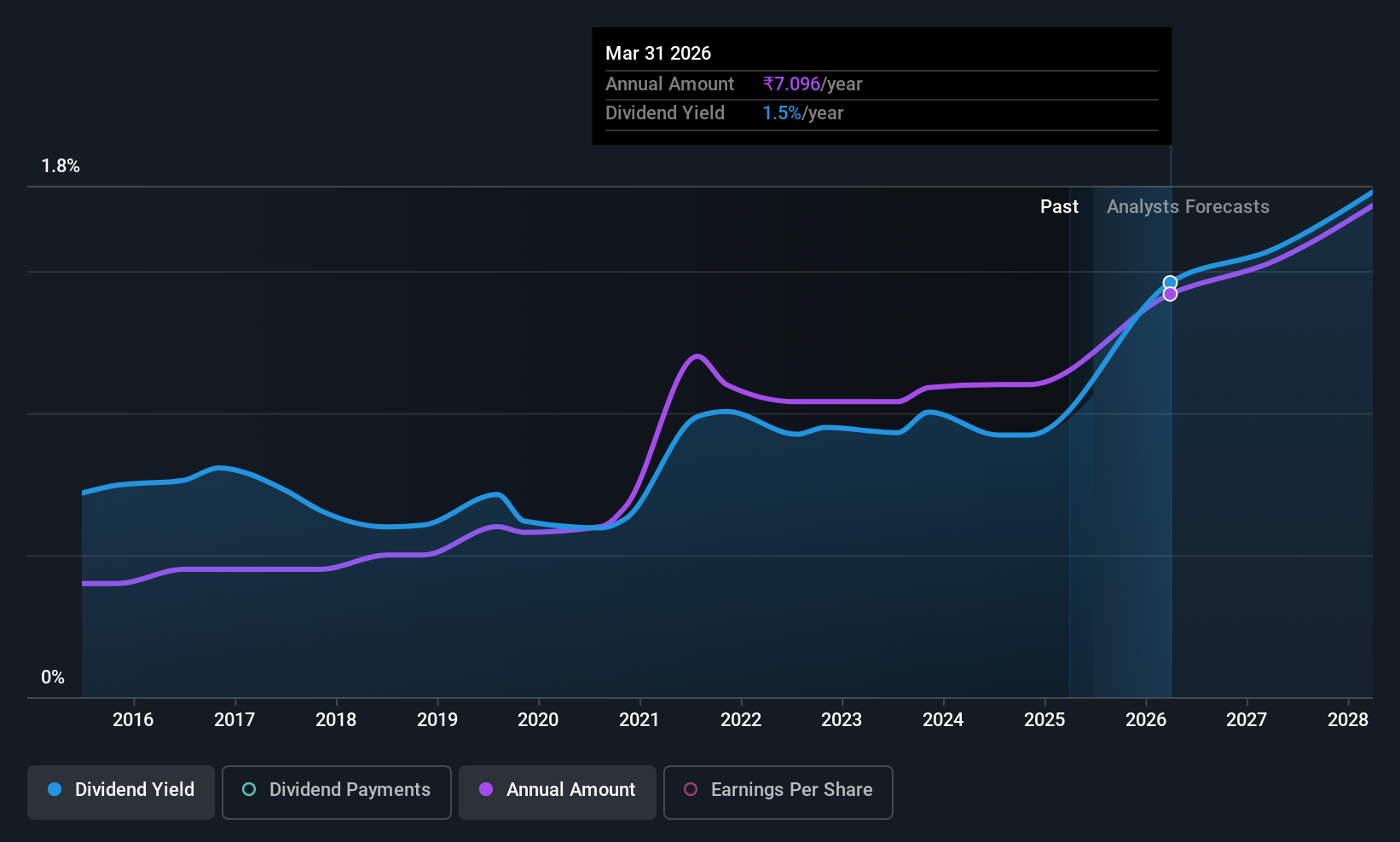- India
- /
- Personal Products
- /
- NSEI:DABUR
Dabur India's (NSE:DABUR) Upcoming Dividend Will Be Larger Than Last Year's
Dabur India Limited (NSE:DABUR) has announced that it will be increasing its dividend from last year's comparable payment on the 12th of August to ₹5.25. The payment will take the dividend yield to 1.6%, which is in line with the average for the industry.
Dabur India's Payment Could Potentially Have Solid Earnings Coverage
While it is always good to see a solid dividend yield, we should also consider whether the payment is feasible. At the time of the last dividend payment, Dabur India was paying out a very large proportion of what it was earning and 100% of cash flows. Paying out such a high proportion of cash flows certainly exposes the company to cutting the dividend if cash flows were to reduce.
Looking forward, earnings per share is forecast to rise by 39.9% over the next year. Assuming the dividend continues along the course it has been charting recently, our estimates show the payout ratio being 65% which brings it into quite a comfortable range.

View our latest analysis for Dabur India
Dividend Volatility
Although the company has a long dividend history, it has been cut at least once in the last 10 years. Since 2015, the dividend has gone from ₹2.25 total annually to ₹8.00. This works out to be a compound annual growth rate (CAGR) of approximately 14% a year over that time. It is great to see strong growth in the dividend payments, but cuts are concerning as it may indicate the payout policy is too ambitious.
The Dividend's Growth Prospects Are Limited
Given that the dividend has been cut in the past, we need to check if earnings are growing and if that might lead to stronger dividends in the future. Earnings have grown at around 4.0% a year for the past five years, which isn't massive but still better than seeing them shrink. Earnings are not growing quickly at all, and the company is paying out most of its profit as dividends. That's fine as far as it goes, but we're less enthusiastic as this often signals that the dividend is likely to grow slower in the future.
Dabur India's Dividend Doesn't Look Sustainable
Overall, we always like to see the dividend being raised, but we don't think Dabur India will make a great income stock. The track record isn't great, and the payments are a bit high to be considered sustainable. We would be a touch cautious of relying on this stock primarily for the dividend income.
It's important to note that companies having a consistent dividend policy will generate greater investor confidence than those having an erratic one. Meanwhile, despite the importance of dividend payments, they are not the only factors our readers should know when assessing a company. For instance, we've picked out 1 warning sign for Dabur India that investors should take into consideration. Is Dabur India not quite the opportunity you were looking for? Why not check out our selection of top dividend stocks.
New: Manage All Your Stock Portfolios in One Place
We've created the ultimate portfolio companion for stock investors, and it's free.
• Connect an unlimited number of Portfolios and see your total in one currency
• Be alerted to new Warning Signs or Risks via email or mobile
• Track the Fair Value of your stocks
Have feedback on this article? Concerned about the content? Get in touch with us directly. Alternatively, email editorial-team (at) simplywallst.com.
This article by Simply Wall St is general in nature. We provide commentary based on historical data and analyst forecasts only using an unbiased methodology and our articles are not intended to be financial advice. It does not constitute a recommendation to buy or sell any stock, and does not take account of your objectives, or your financial situation. We aim to bring you long-term focused analysis driven by fundamental data. Note that our analysis may not factor in the latest price-sensitive company announcements or qualitative material. Simply Wall St has no position in any stocks mentioned.
About NSEI:DABUR
Excellent balance sheet average dividend payer.
Similar Companies
Market Insights
Community Narratives




